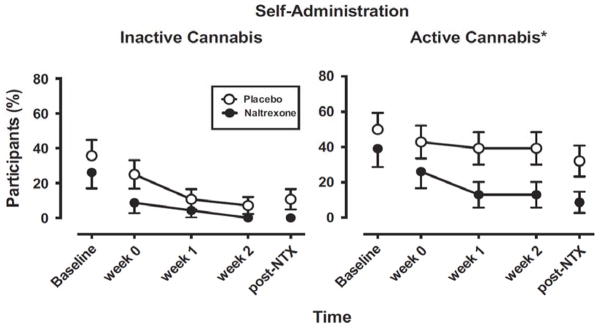Figure 4.
Effects of naltrexone (NTX) or placebo treatment on cannabis self-administration by chronic cannabis users in a laboratory study. Points show the percentage of participants self-administering inactive (0.0% THC) or active (5.5% THC) smoked cannabis as a function of time and naltrexone dose. Baseline refers to the session before naltrexone administration commenced. Post-NTX refers to the session that occurred at least 1 week following termination of naltrexone administration. All participants received placebo capsules during baseline and post-NTX sessions. Self-administration of inactive cannabis was low and not significantly influenced by naltrexone (left panel), but naltrexone significantly decreased self-administration of active cannabis relative to placebo (right panel). Asterisks indicate significant difference between the naltrexone and placebo groups. These findings suggest that opioid antagonists might be useful as medications for decreasing cannabis smoking. Figure from Haney, M., Malcolm, R. J., Babalonis, S., Nuzzo, P. A., Cooper, Z. D., Bedi, G.,…Walsh, S. L. (2015). Oral cannabidiol does not alter the subjective, reinforcing or cardiovascular effects of smoked Cannabis. Neuropsychopharmacology. doi:10.1038/npp.2015.367; Haney, M., Ramesh, D., Glass, A., Pavlicova, M., Bedi, G., & Cooper, Z. D. (2015). Naltrexone maintenance decreases Cannabis self-administration and subjective effects in daily Cannabis smokers. Neuropsychopharmacology, 40(11), 2489–2498. doi:10.1038/npp.2015.108 with permission.

